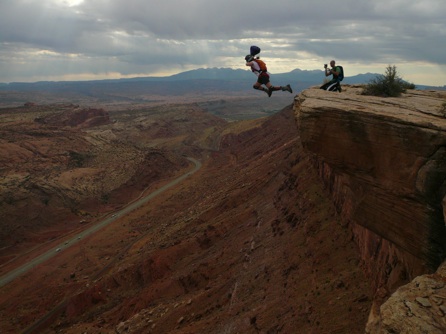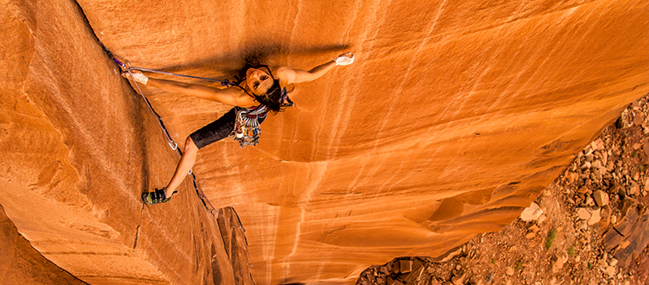Thoughts For an Aspiring Base Jumper

Steph,
First off I love your blog! I check it at work and it lets me escape the
office for a little bit each day. Keep up the good work and know that
your really influencing people to dream and LIVE life not just idle by.
I have been thinking about base jumping quite a bit recently. Here is my
situation:
I am 19, I started skydiving this August and have 39 jumps. BASE has
always fascinated me and as of lately I have really gotten to thinking
seriously about BASE jumping some day. The other day there was a jumper
named Steve flying his wingsuit out at Lost Prairie, my home dropzone
here in Montana. I was talking to him about base as we packed and he had
some of the same suggestions as you. Go to apex base and learn on the
perrine. He also suggested that it would be wise to have more like 500
skydives before getting into BASE. I have kept this number in my mind
alot as I see these 100 jump suggestions come up. I have also been
thinking alot about the dangers that are involved with BASE. I don’t
want to put a number on what I have to reach before I can learn to BASE
jump and still be unprepared. Would you say there was a point in your
skydiving that you knew that you were ready to move on to BASE jumping?
The second question I have is the dangers of BASE. It seems to me that
if you have plenty of skill, experience, good decision making skills,
and training that you should be able to stay safe in the sport. At the
same time I look at the base fatality list and read names of some of the
best base jumpers. I know that ultimately it will be my decision to
start or not. What is your opinion on the dangers of base jumping for a
aspiring base jumper like myself? I know this is much too broad, I simply
cant form this into a single question and I think it is ultimately
something I need to really think about but I would love to hear your two
cents if you would like to give them to me.
Sorry if I rambled on a bit, if I don’t hear back I wish you safe jumps
and blue skies.
Thanks again for being an inspiration,
Vince Arnone
Dear Vince,
I’m sorry it’s been some time since you wrote. I hope you’ve been jumping a lot, and having great holidays. Well, I would have to say the more skydiving you do before starting to base jump, the better. And as I’m sure you’ve noticed, most base jumpers get really unhappy/uncomfortable when young jumpers such as yourself want to start base jumping. It is really dangerous, and no one wants to see a youngster get smashed. I guess no one wants to see anyone get smashed, but you know what I mean. There really is no way to avoid danger.
One thing I would say is that being able to function in high pressure situations is helpful. This is something you know about yourself–some people do and some people don’t. Another thing I would say is that having extremely good canopy skills will get you out of a big percentage of bad situations in base. From my own personal experience, I could have avoided all of the base-related injuries I’ve had if I had had better canopy skills at the time. Doing 500 skydives will inherently give you better canopy skills than doing 100, of course, and doing 1000 will give you even better skills….
For me, I was set on learning to BASE jump pretty quickly after I started skydiving. I live in Moab which is a mecca for base. I spend most of my time on big cliffs in other places too, and I like sports that are self-sufficient and self-driven. As much as we love skydiving, it is definitely more expensive and logistically inconvenient (due to needing airplanes and other jumpers to fill them) than base, especially depending on where you live. Since you live close to a good DZ, you don’t have that problem as much (except for the expensive part). I was living in Colorado in order to skydive, and I looked forward to being at home in Moab, and just being able to walk up to a cliff whenever I felt like doing a jump. So I started paying attention to accuracy landings, and trying to do some helicopter jumps, right away in skydiving, knowing I’d be going to the Perrine in a few months–for my lifestyle, base makes a lot of sense. I actually have to make a bigger effort to go skydiving than to go base jumping, but this is pretty unusual for most people.
Regardless of your age, you’ve got to look sharp, pay attention, and listen to your instincts. It sounds to me like you do all those things. And so as you know, ultimately everything is up to you.
Be careful, I know you will!
xx Steph








Steph thanks for responding to this letter. I have been doing lots of research and reading about BASE since I wrote this letter. (and got a couple more heli jumps :D) The biggest lesson I’ve learned is that I am not going to rush myself into anything. One tip that really helped was that anyone could make many skydives on a tiny swoop canopy and turn to BASE much less prepared than someone who was flying a seven cell preparing for situations that will be encountered in a BASE environment.
Thanks for responding to my letter
Vince
Vince,
I also BASE jump and am also fortunate enough to live in Moab. Great to read that you are doing some good research before potentially taking this big step. If I read your 1st post correctly, the main question you asked was based on this statement of yours “It seems to me that if you have plenty of skill, experience, good decision making skills, and training that you should be able to stay safe in the sport.” As you mentioned, there is no easy two sentence answer, but I shall just try and throw something your way to think about. When you skydive and your canopy opens you are generally a long distance apart from hitting anything at the time of opening. If you have a malfunction and all else fails, you have a reserve parachute. If you jump of a 300 feet tall cliff and you do not open perfectly on heading you will be at best 20 feet from the cliff and since your parachute has forward speed, you are heading towards it. Does your parachute open on-heading everytime you skydive? If you have a problem with your canopy in BASE, you better be prepared to deal with it – you exited at 300 feet and there is no reserve (and even if there was one, it would be of little use at this height). Assuming you opened on heading and without any problems with your canopy, you need to land somewhere – sorry, no grassy DZ here – avoid the rocks, or find a big one to land on! This is why BASE is dangerous – “In BASE, if at first you don’t succeed, then BASE is not for you” – there are not many 2nd chances. Appologize if this sounds harsh or rude, it is not intended against you, but if you decide to venture into BASE, you need to be ready for the consequences – serious injury or death for yourself. In addition, you will have to deal with your friends getting hurt or injured and please, think about your family and non-jumping friends – are they ready to deal with your potential misfortune. As you noted, some of the best and most skillful BASE jumpers are on the fatality list – there are few of us without a lost friend or scars. Best Wishes Mick
Good for you Vince! The one thing I know for sure about BASE, is that not rushing is definitely the best thing you can do.
xx S
[…] Davis at High Places — who usually writes about rock climbing and base jumping — has some advice on how to live simply. She writes: “I have always been determined to […]
Hello. I would really like to begin base jumping do you have any ideas on where I could find gear or mabye a company to go with? Thanks so much I love your blog.